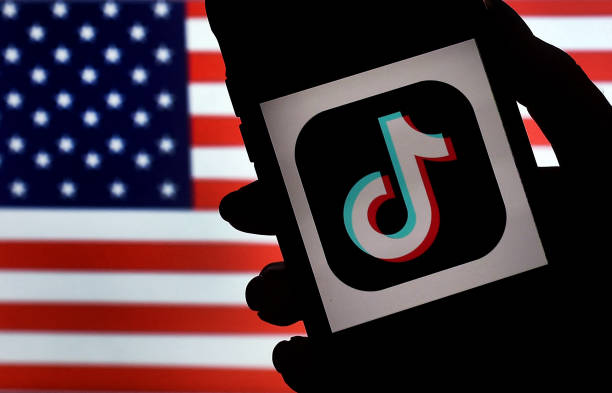TikTok Ban Sparks Debate Over Government Overreach and Freedom of Information
3 min read
TikTok displayed on an iPhone American flag in the background (Photo By Getty Images)
United States (The Lake Tribune) – The looming possibility of a TikTok ban in the United States has ignited a fierce debate over government overreach, the freedom of information, and the role of technology in the public sphere. Critics argue that the government’s stance against TikTok, a platform with unprecedented global reach, underscores a broader attempt to control and regulate the flow of information—an endeavor at odds with the principles of a free and open society.
The Protecting Americans from Foreign Adversary Controlled Applications Act, recently passed by the House and awaiting Senate consideration has been positioned by proponents as a necessary measure to protect national security. They claim TikTok’s Chinese ownership poses risks of data surveillance and propaganda dissemination. However, many see this as a pretext for a broader agenda to place information dissemination under tighter control, especially given that TikTok has become a vibrant platform for spreading awareness on various issues, from legislative bills and free energy concepts to whistleblower testimonies, that are often underreported or ignored by traditional media outlets.
The contention is not merely about the data collection practices of TikTok, which critics argue are no more invasive than those of other social media giants. Instead, the crux of the debate centers on the unprecedented access to information that TikTok facilitates. This platform has democratized information dissemination, allowing users to share and consume content on a scale and with a speed that is unparalleled in history. For the first time, information is not only accessible but is also not predominantly regulated or influenced by government entities.
This situation has led to a standoff between the government and the public, with the former citing national security concerns as a rationale for potentially banning the app. Yet, many argue that there has been no concrete evidence to substantiate claims of a security breach through TikTok, suggesting that the government’s actions may stem from a desire to control a narrative rather than protect its citizens.
Moreover, the potential ban raises questions about the future of information freedom and the digital public square. TikTok has emerged as a crucial platform for political engagement and social activism, enabling users to mobilize, educate, and advocate for change in ways that challenge traditional power structures. The ban, therefore, is seen by some as not just an act of government overreach but as an assault on the foundational principles of democratic engagement and free expression.
The debate over TikTok transcends the app itself, touching upon deeper issues related to the governance of the digital age, the right to free speech, and the balance between security and freedom, as well as more pressing issues that the public feels need attention. It reflects growing concerns about who holds the power to control information in a world increasingly mediated by technology. As the discussion continues, the outcome of this controversy will likely have far-reaching implications for the relationship between governments, technology companies, and the individuals who navigate the digital world they co-create.
Follow The Lake Tribune for More Reliable News





